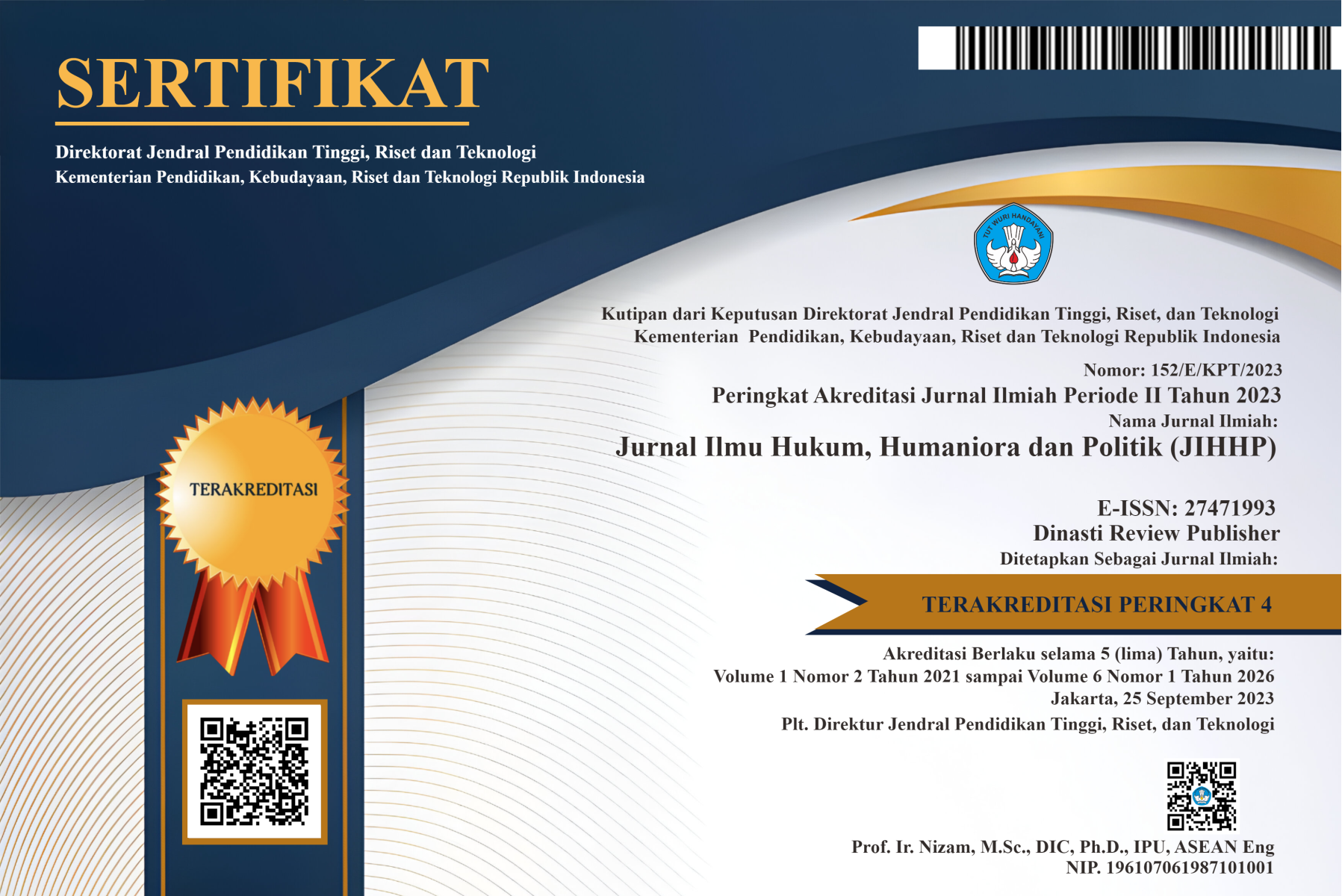Pemenuhan Kewajiban Perpajakan Apoteker Pemilik Usaha Apotik Pasca Diundangkanya UU Cipta Kerja
DOI:
https://doi.org/10.38035/jihhp.v4i3.1964Keywords:
Pharmacist, Pharmacy Business Owner, Tax ObligatioAbstract
In 2021 the government issued Minister of Health Regulation Number 14 of 2021 concerning Standards for Business Activities and Products in the Implementation of Risk-Based Business Licensing in the Health Sector (hereinafter abbreviated as Minister of Health Regulation No. 14 of 2021). In this regulation there are several changes, one of which is that the pharmacy must be owned by a pharmacist. If the pharmacy is not owned by a pharmacist, the capital owner may collaborate with the pharmacist by agreement before a notary. With this provision, there have been several changes for a pharmacist, one of which is regarding the fulfillment of tax obligations. Tax obligations for pharmacists who work only as pharmaceutical technical personnel, their tax obligations that must be fulfilled are only based on the KUP Law and Article 21 of the Income Tax Law Number 36 in 2008, which was most recently refined by Law Number 7 of 2021 concerning Harmonization of Tax Regulations. namely tax deductions by third parties, in this case by pharmacies. Meanwhile, with the Pharmacist's status as a Pharmacy owner, the fulfillment of his tax obligations will increase in accordance with Tax regulations, namely Business Entities. The problem is what if, during the course of the pharmacy business, the pharmacist who owns the pharmacy which was established based on the agreement resigns, what happens to fulfilling his tax obligations. In this regard, there are three problems that the researcher raises, first, what is the description of pharmacy ownership by pharmacists in West Sumatra, second, how to fulfill tax obligations for pharmacists as pharmaceutical workers and pharmacy owners in West Sumatra. third, problems encountered in fulfilling tax obligations by pharmacists who own pharmacies. In West Sumatra, the research uses research methods with an empirical juridical approach, descriptive research type, the data required is primary and secondary data as well as data collection techniques, interviews and document studies, data processing is carried out using qualitative analysis methods. The results of research on pharmacy ownership in West Sumatra are currently in various forms of business, namely Limited Liability Companies and Individual Businesses such as CVs and Firms so that ownership of Pharmacies is still owned by investors and currently there are 5 Pharmacies which are processing the extension of their Pharmacy Business Licenses and some have transferred their ownership to Children of financiers because they have completed their pharmacy studies, and there are also those who are currently processing business permits in the form of individual PT. Meanwhile, the tax obligations carried out by pharmacists as pharmacy business owners have not yet been implemented because currently pharmacies that use pharmacists as pharmacy owners with non-legal entity business forms are still in the process of processing their permits and legal entities. Problems encountered in fulfilling the tax obligations of pharmacists as business owners Pharmacies are still not visible, because the current status of Pharmacists still has the status of a Pharmaceutical Personnel, so their tax obligations are only limited to Income Tax Article 21.
References
Alexandra Indriati Dewi, 2008, Etika dan Hukum Kesehatan. Yogyakarta: Pustaka Book Publisher
Bambang Sunggono, 2003, Metode Penelitian Hukum, Cetakan 5. Jakarta: PT Raja Grafindo Persada
Bambang Waluyo, 2002, Penelitian Hukum Dalam Praktek. Jakarta: Sinar Grafika
Cholid dan Abu Achmadi Narbuko, 2003, Metodologi Penelitian. Jakarta: PT. Bumi Aksara
Ikatan Apoteker Indonesia, 2016, Standar Kompetensi Apoteker Indonesia. Pengurus Pusat Ikatan Apoteker Indonesia
Mardiasmo, 2016, Perpajakan Edisi Revisi Tahun 2016, Yogyakarta: Penerbit Andi
Sarifuddin Azwar, 1998, Metode Penelitian. Yogyakarta: Pustaka Pelajar
Siti Resmi, 2017, Perpajakan Edisi 10 Buku I: Teori dan Kasus. Jakarta: Salemba Empat
Soerjono Soekanto, 1990, Aspek Hukum Apotik dan Apoteker. Bandung: Mandar Maju
Sugiono, 2009, Memahami Penelitian Kualitatif. Bandung: Alfabeta
Suharsimi Arikunto, 2012, Prosedur Penelitian Suatu Pendekatan Praktek.
Jakarta: Rineka Cipta
W.J.S. Poerwodarminto, Kamus Besar Bahasa Indonesia (KBBI), Jakarta: Balai Pustaka
Gusminarti , Literisasi Hukum dan Perpajakan dalam Profesi Apoteker, 2021, Webiner PD Ikatan Apoteker Indonesia Cabang Sumatera Barat , 15 januari 2021 .
Summers and Mackie, 2006, “The Role of The Pharmacist in the Health Care System: preparing the future pharmacist – curricular development”, Jurnal American Journal of Pharmaceutical Education.
UUD 1945
UU Nomor 11 Tahun 2020 disempurnakan dengan
UU Nomor 6 Tahun 2023 tentang Cipta Kerja
UU Nomor 7 Tahun 2021 tentang Harminisasi Peraturan Perpajakan .
UU Nomor 28 Tahun 2007
UU Nomor 36 Tahun 2008
UU Nomor 42 Tahun 2009
UU Nomor 7 Tahun 2021
Permenkes Nomor 9 Tahun 2017
Permenkes Nomor 14 Tahun 2021
Downloads
Published
How to Cite
Issue
Section
License
Copyright (c) 2024 Gusminarti Gusminarti, Khairani Khairani, Fajri Kurniawan

This work is licensed under a Creative Commons Attribution 4.0 International License.
Hak cipta :
Penulis yang mempublikasikan manuskripnya di jurnal ini menyetujui ketentuan berikut:
- Hak cipta pada setiap artikel adalah milik penulis.
- Penulis mengakui bahwa Jurnal Ilmu Hukum, Humaniora dan Politik (JIHHP) berhak menjadi yang pertama menerbitkan dengan lisensi Creative Commons Attribution 4.0 International (Attribution 4.0 International CC BY 4.0) .
- Penulis dapat mengirimkan artikel secara terpisah, mengatur distribusi non-eksklusif manuskrip yang telah diterbitkan dalam jurnal ini ke versi lain (misalnya, dikirim ke repositori institusi penulis, publikasi ke dalam buku, dll.), dengan mengakui bahwa manuskrip telah diterbitkan pertama kali di JIHHP.
















































